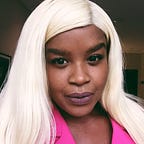15 Ways White Women Avoid Accountability On The Internet
I’ve seen it many times. A white woman causes harm within a digital space and when she’s called-in: she leans all the way. She refuses to see the hurt she’s caused. She believes that her mistake means that she is a mistake (see white supremacy culture here). She lies. Cries. She blames the Black or brown person for holding her accountable. But there is a different path — a path that leads to liberation.
And this means embracing accountability. To prime yourself for being held accountable on social media when you say something or do something that hurts BIPOC communities — here is a list of 15 ways white women avoid accountability on the internet:
1. Deletes original posts without apology.
2. Leaves original post up — without apology.
3. Ignores calls to be called-in.
4. Ignores the opportunity to have their perpetuation of white supremacy be called out.
5. Cries that they are being attacked when in facts the correction is measured and intentional — not brutal and seeking to destroy them or tear them down as human beings.
6. Turns off the comment section without apology.
7. Deletes comments from members of their community — especially Black and brown people who are not threatening them nor participating in any forms of violent bullying.
8. Ignores the emotional labor of those who are correcting them because they do believe in part that they can change and are invested in their growth as people — not as gatekeepers of whiteness but as people.
9. Changes the settings of a post from public to private without an apology.
10. Does not keep the same energy when apologizing.
11. Prioritizes the comfort of their white women followers over the health and wellbeing of the Black or brown person they have publicly hurt.
12. Holds onto perfectionism as a pillar of white supremacy. Offers no apology out of fear that they will be seen as imperfect. Meanwhile, offers to lead as speakers, facilitators, givers, helpers in educational spaces focused on embracing the fullness and the wholeness of our humanity.
13. Ignores calls to change behavior. Does not respond. Does not honor the labor of BIPOC who lovingly hold them accountable. (Here love refers not to a fake nice approach to holding them accountable, love refers to the level of emotional labor a BIPOC must extend to say to a white person in a sea of white people perpetuating white supremacy “Hey. I’m going to trust you enough to say this hurt me. I’m going to love you enough to tell you when you are causing great harm. That’s love).
14. Unfollows, unfriends, and blocks BIPOC who are holding them accountable for their behavior — this blocking is not because those BIPOC are doing this in a degrading or dehumanizing way — but because they are doing it at all.
15. Gives up on their own growth ahead of time. Uses spiritual language as a means of cloaking their feelings of inadequacy in anti-racist spaces but when it is time to act in a spirit of smashing whiteness and white supremacy — hides. Blames those holding them accountable for holding them accountable. Does not seek repair.
I write this post because those who want to do better — still can. Even if the hurt caused was years ago and you ran from it then. You can address it now and seek repair.
That’s what anti-racism work is. It’s labor. It’s holding ourselves and one another accountable for our harm committed to the transformation of their behavior, perspective, approach to the ways they hold community. It is not easy. It is not nice. It’s firm. It’s kind. It’s fluid. It is unflinching in the face of white supremacy. It does not negotiate with racism. It does not allow white women to hide behind performative intention and baseless “kindness.”
There has to be a form foundation for the truth.
There has to be a firm pillar for accountability and growth.
This is not your great grandfather’s white supremacy fan club.
You can grow here. You can become better than you used to be — but you have to be willing to be imperfect.
You have to be willing to be honest when you realize that you’ve reverted to whiteness and internalized patriarchy to show you how to be a human being. That can’t teach you that.
But anti-oppression can.
Change. Grow. Give yourself permission to do better. Set the boundary.
